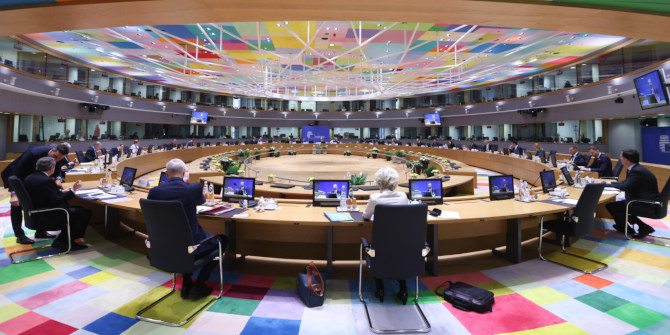Slovenia will hold its European Parliament election on 9 June. As Tim Haughton and Alenka Krašovec write, Janez Janša and his Slovenian Democratic Party are aiming to make the vote a referendum on the current government led by Robert Golob’s Freedom Movement.
This article is part of a series on the 2024 European Parliament elections. The EUROPP blog will also be co-hosting a panel discussion on the elections at LSE on 6 June.
European Parliament elections offer voters a chance to choose representatives and endorse visions. But they also provide opportunities to pass judgements and vent frustration with the state of domestic politics.
It is clear what the dominant figure of the past two decades of politics and three-time Prime Minister in Slovenia wants to do. Janez Janša and his Slovenian Democratic Party (SDS) would like to make this summer’s European Parliament election a referendum on the unpopular coalition government led by Robert Golob’s Freedom Movement. Or as Janša puts it, the European elections can be a “wake-up call”.
A major plank of Golob’s appeal in the 2022 general elections was his background as a successful manager of an energy company. But the past two years have shown the stark differences between running a business and managing a coalition government. Despite some successes dealing with the energy crisis, there is widespread disappointment in a government that promised much, but has delivered considerably less.
The striking success of the Freedom Movement in 2022 and a series of new parties in a succession of general elections in Slovenia owed much to voters’ attitudes to Janša. Loved by his supporters, but loathed by his opponents, most national parliamentary elections over the past twenty years have revolved around stopping or supporting Janša becoming Slovenia’s premier.
The choice of Prime Minister is not on the table in a European Parliament election, but these elections provide an opportunity for both parties and voters to send a strong signal. All parties see the election as a chance to demonstrate their political virility and relevance. Janša’s SDS is keen to send a strong message about the unpopularity of the incumbent government and is focusing most of its efforts on mobilising their supporters.
Referendums and migration
One tool for mobilisation is referendums. Drawing on the country’s long tradition of referendums, parties from both the opposition and government have proposed holding consultative referendums close to or simultaneously with the European Parliament election. It is unclear at this stage how many of the nine referendums proposed will actually take place, but even just proposing them a few months ahead of the elections helps raise the profile of issues and parties.
Migration is likely to be a prominent theme in many member states in the European Parliament elections. Slovenia is no exception. The SDS’s proposed referendum on the accommodation of illegal migrants highlights that immigration is a key theme and one that is expected to mobilise voters. Migration has attracted heightened attention recently after the government decided to set up two centres for asylum seekers in small towns without any consultation with the local population. The predictable reaction from residents was swiftly capitalised on by the SDS.
The other European issue that may play a role in the elections is the EU’s Green Deal. The environment has become a more visible issue in recent months and Slovenia has seen its fair share of farmers’ protests, although who will capitalise on this discontent remains unclear at this stage. A green party, Vesna, will run in the elections. The fact it has decided to join forces with Vladimir Prebilič, placing the popular local mayor at the top of their list, highlights both the limits of Vesna’s appeal and the importance of the order of party lists.
Thresholds and lists
Winning a seat in the European Parliament not only brings parties some additional visibility and funds but also indicates their level of support and potential for national elections. Given Slovenia’s size, it will elect only nine MEPs under its proportional representation list system (with one preferential vote), meaning the effective electoral threshold is quite high.
Only the SDS and Freedom Movement look certain to win seats, but even then the limited number of seats generates internal debates about who should be in first, second and last place on the list. It is striking that Freedom Movement has already announced its candidate for EU Commissioner and announced the candidates who will run in the elections, but has not yet determined the order of the list.
There was some advanced discussion about Slovenia’s three members of the European People’s Party (SDS, New Slovenia and the Slovene People’s Party) forming a joint list, but they failed to reach agreement. In consequence, New Slovenia (NSi) chose to place its party leader, party parliamentary group leader, a former leader and one of Slovenia’s more prominent MEPs on its candidate list. Current polling suggests NSi has a chance of winning one seat, but the high profile list is designed primarily to boost the national standing of the opposition party and challenge the SDS’s hegemony on the (centre-)right of the political spectrum.
Party lists have also generated much discussion within the governing coalition. The Left Party (Levica) has experienced turbulence since it entered Golob’s government in 2022, especially between its radical and moderate wings, prompting long-term leader Luka Mesec to step down, although he remains Minister of Labour and Social Affairs. In an attempt to boost the party’s chances in the European elections, the charismatic erstwhile leader has offered to run, but only in last place as he stated a desire to finish some projects at the ministry.
Freedom Movement’s other coalition ally, the Social Democrats (SD), have experienced a difficult few months thanks to a couple of corruption scandals that have exacerbated tensions between its traditional wings and the more moderate European centre-left forces. Foreign Minister and former MEP Tanja Fajon stepped down as SD leader earlier this year and on 13 April she was replaced by Matjaž Han, the current Minister of Economic Development and Technology. At present it is unclear what his appointment will mean for the cohesion of the party and whether it will muster enough votes to win a seat in the European Parliament.
A different home for far-right voters
Coverage of the European Parliament elections across Europe has raised the spectre of far-right parties winning big in June. For much of independent Slovenia’s existence, the Slovene National Party (SNS) was the standard bearer of nationalist politics in the country. But the SNS is a spent force. Some nationalist voters will rally behind the anti-system and pro-Russian Resni.ca party that emerged out of the anti-lockdown movement during the COVID-19 pandemic, but many more will likely cast their ballots for the SDS.
The SDS’s blend of nationalism and conservatism will mop up some of the support of Eurosceptic and nationalist inclined voters. This reminds observers of European Parliament elections not just that voters’ preferences cannot be judged simply by which party they cast their ballot for but that the SDS remains the home for a third of Slovene voters and central to the structure of party competition in the country.
Note: This article gives the views of the authors, not the position of EUROPP – European Politics and Policy or the London School of Economics. Featured image credit: European Union






This was very useful indeed – thank you. After Brexit I applied for Slovene Citizenship and was granted that in September 2023 and now use my Slovene Passport all the time. My voting choice has been helped enormously by your post.
Antony Lehmann